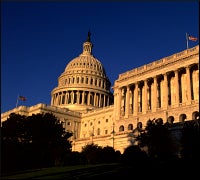 |
WASHINGTON — As the U.S. struggles to rebuild a broken economy and address the myriad other challenges it faces, the software industry is calling for lawmakers to place IT’s needs at center stage.
The Business Software Alliance (BSA) today unveiled a policy agenda recommending that the incoming Obama administration bring a technology perspective to every key issue on the horizon in 2009 — ranging from immigration and education to healthcare.
“What we’ve encouraged the president-elect to do, is that when we’re dealing with every major issue — regarding employment, regarding education, regarding the environment, regarding healthcare — there should be a question [about] what is the role of IT in helping us address those solutions,” BSA President and CEO Robert Holleyman said today at the group’s Washington office.
“Our view is that is the technology agenda. It’s recognizing that we’ve now moved to an integration of technology into all the major governmental priorities.”
The announcement from the BSA, whose members include companies like Microsoft, Apple and Hewlett-Packard, comes at a time when companies and advocacy groups in all industries are lining up policy agendas in anticipation of a new administration and Congress.
Part of the BSA’s agenda calls on the government to include provisions for telemedicine and online medical records as it considers healthcare reform. Microsoft (NASDAQ: MSFT) and Google (NASDAQ: GOOG) have both launched initiatives aimed at digitizing health records so that a doctor could instantly call up the file of a new patient.
Online healthcare initiatives have stirred some controversy over privacy concerns, but Holleyman said that some medical experts believe that the real opposition comes from doctors who want to preserve the status quo.
Holleyman suggested that from a technical standpoint, the security and privacy issues that have dogged efforts to bring the healthcare industry online could be easily addressed.
Security and privacy are both planks of the BSA’s agenda. The group is calling for a federal data-breach notification law to take the place of the current hodgepodge of state laws, as well as tougher penalties for cyber crime.
On the privacy front, the BSA is asking the government to encourage consumer education and adopt “a workable policy framework that doesn’t unduly restrict the flow of information and commerce.”
With e-healthcare, as with the rest of its agenda, the BSA is asking the government to remain open to using both proprietary and open source software models.
“We should be a technology-neutral country,” Holleyman said. “Let a thousand flowers bloom. We believe that it would be a mistake for the U.S. government, particularly in an area as critical as providing IT health solutions, to … only look at one series of solutions.”
BSA also added its name to the growing number of groups calling for greater broadband deployment through some form of public-private partnership.
Many are presuming that the broadband issue will be one of the top priorities for whomever Obama names as the nation’s first chief technology officer.
But the scope of that job has been a matter of considerable speculation. It is still unclear if the CTO will be a Cabinet-level position, as has been widely suggested. It also remains to be seen how much of a role the person will play in shaping outward-facing technology policy, or if the responsibilities will be limited to modernizing and streamlining the government’s internal IT operations.
For the BSA, the choice is an easy one.
“We think that he or she should be a fundamental part of the president’s economic team,” Holleyman said. “While that person is addressing the immediate needs, they really should be helping develop policies that look to the long term.”
The group also reiterated its commitment to a couple of longstanding priorities of the software industry: cracking down on software piracy and increasing the visa cap for foreign workers.
Along with providing more H1-B visas, the BSA is calling on the government to fully fund initiatives to improve math and science education in elementary and high schools, and to make the corporate tax credit for research and development permanent.


